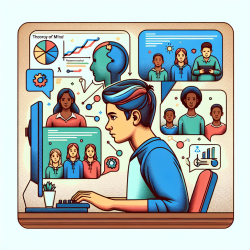In the realm of speech-language pathology, evidence-based interventions are critical for fostering positive outcomes in children, especially those with autism spectrum disorders (ASD). A recent study titled "Examining the Effects of Theory of Mind and Social Skills Training on Social Competence in Adolescents with Autism" provides valuable insights into how we can enhance social competence in adolescents with ASD.
Key Findings from the Study
The study utilized a combination of Theory of Mind (ToM) and social skills training, termed ToM-SS, to improve social competence in three adolescents with ASD. The intervention was found to be effective, demonstrating substantial improvements in:
- Theory of Mind Skills: Understanding that seeing leads to knowing, identifying desire-based and context-based emotions.
- Social Skills: Praising others, expressing emotions, and seeking help.
Feedback from teachers and parents also indicated good social validity, reinforcing the practical benefits of the intervention.
How Practitioners Can Implement These Findings
1. Integrate ToM and Social Skills Training
Combining ToM components (e.g., understanding desires and beliefs) with social skills training (e.g., expressing emotions, praising others) can create a more comprehensive intervention program. This holistic approach addresses multiple facets of social competence simultaneously.
2. Utilize Discrete Trial Teaching (DTT)
The study employed DTT, a structured teaching method that involves breaking down skills into smaller, manageable components. This method can be particularly effective for adolescents with ASD, helping them to master each skill incrementally.
3. Tailor Interventions to Individual Needs
The study's success was partly due to the individualized nature of the intervention. Each participant had specific target behaviors based on their initial assessments. Practitioners should conduct thorough assessments to identify the unique needs of each adolescent and tailor interventions accordingly.
Encouraging Further Research
While the study offers promising results, it also highlights the need for further research. Future studies should explore:
- Generalization of Skills: Investigating how well these skills transfer to natural settings outside the intervention environment.
- Long-term Effects: Assessing the sustainability of these improvements over extended periods.
- Larger Sample Sizes: Conducting studies with more participants to validate these findings on a broader scale.
Conclusion
The integration of Theory of Mind and social skills training presents a powerful approach to improving social competence in adolescents with ASD. By adopting these evidence-based strategies, practitioners can make data-driven decisions that lead to meaningful improvements in the lives of their clients.
To read the original research paper, please follow this link: Examining the Effects of Theory of Mind and Social Skills Training on Social Competence in Adolescents with Autism.










